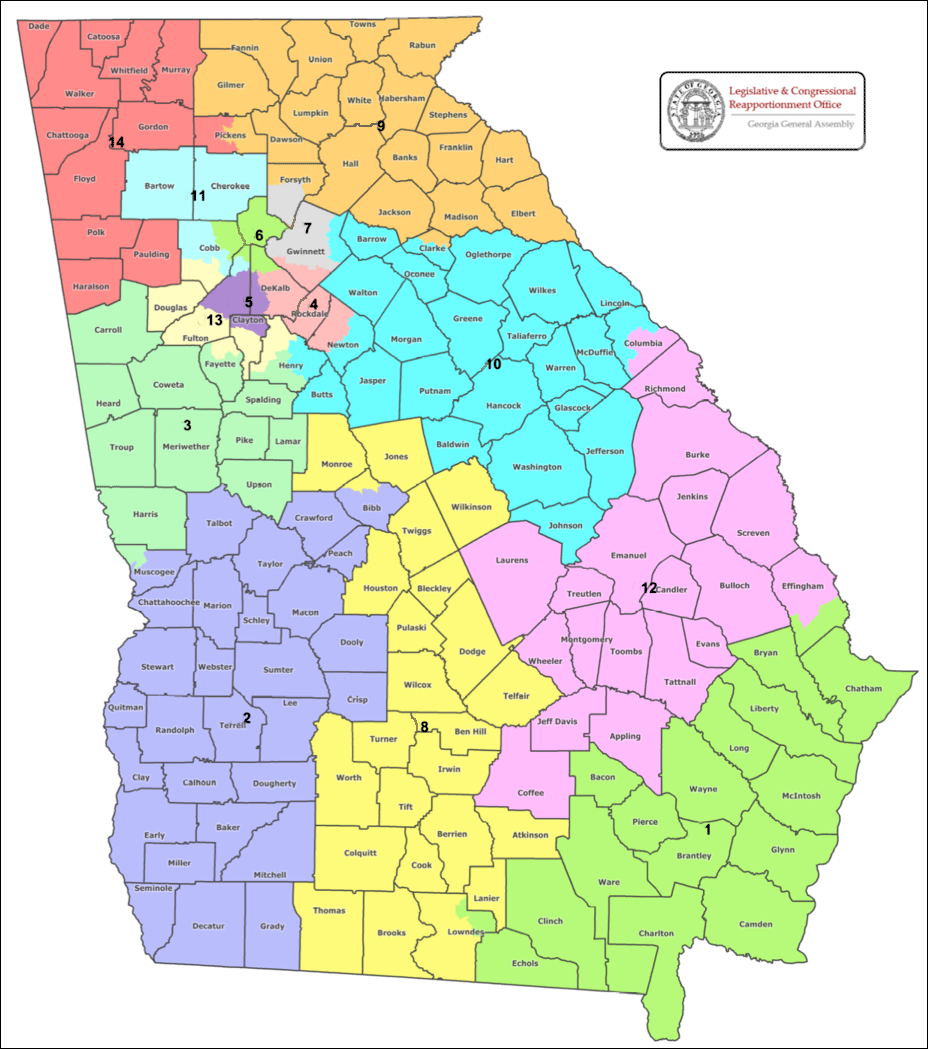By Jim Ellis — May 25, 2022
Primary Results
Georgia: Gov. Brian Kemp turned back former Sen. David Perdue with an unpredicted landslide 74 percent win in what was clearly the most anticipated race of the evening. While polling showed that the governor would be re-nominated, a huge 74-22 percent vote spread was unforeseen. Considering where Gov. Kemp started after the 2020 election and former President Donald Trump piling on him up until the day of this vote, Kemp’s win was extraordinary within a primary turnout of just under 1.2 million GOP voters, the size of which has not been previously seen.Also scoring big was Herschel Walker in the US Senate Republican primary. He won with more than 68 percent of the vote and now advances to face Sen. Raphael Warnock (D) in the general election. Sen. Warnock had only minor opposition in the Democratic primary and captured 96 percent of the 713,000-plus Democratic votes that have been recorded.
In the 7th Congressional District Democratic incumbent pairing contest, Rep. Lucy McBath (D-Marietta) scored a huge 63-31 percent victory over freshman Rep. Carolyn Bourdeaux (D-Suwanee). The two incumbents became paired when the Republican map drawers decided to make the new 6th District safely Republican, thus forcing McBath into the adjoining 7th CD.
Alabama: Rep. Mo Brooks (R-Huntsville), who former President Trump pulled back from endorsing because, at the time, it was viewed his campaign was going nowhere, rebounded to capture second position (29.2 percent) in the open US Senate Republican primary and advance to the June 21 runoff election. The first-place finisher is former Business Council of Alabama President & CEO Katie Britt (44.7 percent). Both defeated retired “Black Hawk Down” pilot Mike Durant (23.3 percent), whose self-funded campaign fell short of the mark in what was an expensive three-way race.
In the contested Republican gubernatorial primary, Alabama Gov. Kay Ivey (R) won re-nomination with 54 percent of the vote against eight Republican opponents. Here, too, GOP turnout was much higher than the Democrats’ — over 645,000 voters compared to 168,000. In both Georgia and Alabama, the Trump endorsements clearly lacked the punch we have seen in the other early primaries.
Arkansas: Sen. John Boozman turned back three Republican challengers to win his re-nomination outright with 58 percent of the vote. All four GOP US House members were also re-nominated, though 2nd District Rep. French Hill (R-Little Rock) posted a surprisingly low 58.5 percent.
The open governor’s race produced no surprise. Former Trump press secretary and daughter of ex-Gov. Mike Huckabee, Sarah Huckabee Sanders, won a landslide Republican nomination with 83.2 percent of the vote. She will easily replace term-limited Gov. Asa Hutchinson (R) in the autumn election.
MN-1 Special Primary: The Minnesota special congressional primary to begin the replacement process for the late Rep. Jim Hagedorn (R-Blue Earth/Rochester) is also undecided. The Republican side now features a two-way battle between former state Rep. Brad Finstad (38.0 percent) and state Rep. Jeremy Munson (36.8 percent) with 88 percent reporting. The Finstad lead is 427 votes, which may or may not stand up as the final counting process proceeds.
On the Democratic side, former Hormel company CEO Jeff Ettinger won the party nomination with 64.3 percent of the vote over seven opponents. The eventual nominees will square off in a special general election on Aug. 9, a date concurrent with Minnesota’s regular primary election. Republican turnout so far surpasses the Democratic participation rate by almost a 2:1 margin, 35,330 to 18,392.
Texas: The Texas results featured a crushing defeat for the Bush family, as two-term incumbent Attorney General Ken Paxton swamped Land Commissioner George P. Bush, son of former Florida Gov. Jeb Bush, with a 67.2 – 32.8 percent margin. Paxton will now face attorney Rochelle Garza who won the Democratic runoff with 62.9 percent of the vote.
There are two unresolved congressional races at this writing. In one of the South Texas seats, veteran Rep. Henry Cuellar (D-Laredo) leads attorney Jessica Cisneros by just 177 votes with 94 percent of the expected vote recorded. Most of the outstanding vote appears to come in Cuellar-favorable counties, so it is more likely that he survives a very close primary and runoff set of elections.
In the contested open 15th District, in what could well become the most hotly contested general election in the Lone Star State, the Democratic runoff is still a long way from being decided. Candidates Michelle Vallejo and Ruben Ramirez are only 23 votes apart with just 50 percent of the counting reported. This contest could require quite a bit of time to decide. The eventual winner will face the 2020 Republican nominee, Monica de la Cruz, who easily won re-nomination outright back on March 1.
Moving to the open Dallas-anchored 30th District, State Rep. Jasmine Crockett (D-Dallas) recorded a 60.6 percent runoff win to capture the party nomination in the safely Democratic seat. She will succeed retiring US Rep. Eddie Bernice Johnson (D-Dallas) in November. Johnson has represented the area in Congress for the past 30 years.
House
NY-19: Rep. Delgado to Take Oath for Lieutenant Governor; Will Resign Today — US Rep. Antonio Delgado (D-Rhinebeck) will officially be sworn in as the state’s new lieutenant governor later today. Resigning the congressional seat just before taking the oath of office allows Gov. Kathy Hochul (D) to schedule the special election to replace Delgado concurrently with the Aug. 23 congressional primary. The political parties will choose their respective nominees, meaning there will be only one election to fill the balance of the congressman’s current term. The new member then could seek a full term in the new 19th CD, which will be different in configuration to the current pre-redistricting seat.
Governor
Michigan: Top GOP Candidate Facing Disqualification — Media reports surfacing from Michigan are indicating that several Republican candidates, including polling front-runner James Craig, the former Detroit Police Chief, may fall short of presenting 15,000 valid registered voter petition signatures to qualify him for a ballot position. According to the Michigan Bureau of Elections, 9,879 of Craig’s signatures were invalid for various reasons, leaving him well short of the 15,000 minimum number.
Another gubernatorial candidate, businessman Perry Johnson (R), is in similar position. The Michigan governor’s race is one of he premier statewide campaigns in the country this year, so with Craig potentially being ousted as a candidate, that’s a major developing story.






